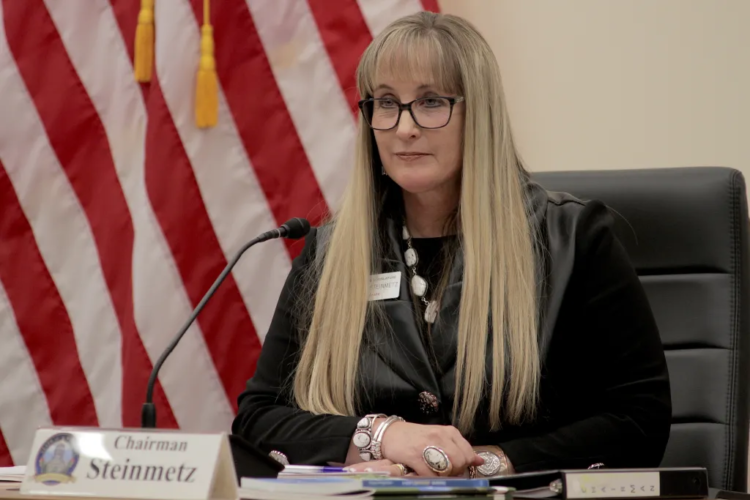This article was originally published in WyoFile.
As the Wyoming Department of Education prepares to roll out a new education savings account program, school choice advocates are again asking lawmakers to expand the non-public school program to more families.
That is one of the warnings that expansion could jeopardize the already controversial constitutionality.
It’s the latest twist in a measure that has been reformed, repealed, revived, amended, passed by the Legislature and then partially blocked by the governor dozens of times. Mark Gordon in March before it eventually became law. The tug-of-war reflected the different outcomes proponents hoped the bill would achieve: early childhood education for some, universal access to nonpublic school choice for others.
Get stories like this delivered straight to your inbox. Sign up for the 74 newsletter
As it stands now, the law creates a program to give qualified families state funds to offset private, preschool and homeschooling expenses. Families earning up to 150 percent of the federal poverty level — $48,800 for a family of four — could qualify for up to $6,000 to help pay for a child’s education in grades 4 through 12. Allowable uses include school supplies, tuition or tutoring.
Gordon limited the income requirements by removing families on the wealthier end of the spectrum when he vetoed parts of the bill before it passed. Gordon’s changes were motivated by constitutional concerns, he noted, explicitly pointing to the Wyoming Constitution’s prohibition on the state giving money to individuals “except for the necessary relief of the poor.”
His vetoed version may not mean the end of the saga; proponents of free school choice expressed interest in further amending the bill to broaden admissions criteria during a meeting of the joint education committee on Wednesday.
“Should we amend this legislation in the next session?” Sen. Cheri Steinmetz (R-Lingle) asked. “Because we clearly had a different idea of what we were trying to do with this bill, then perhaps the governor’s veto reflects that.”
A rocky path
The Education Savings Account Act has its roots in a pair of bills introduced during the 2023 legislative session. They would have given families $6,000 per K-12 student to cover non-government school tuition or related education costs. Those measures failed, but a new proposal that would have extended the money to early childhood education costs emerged between the 2023 and 2024 sessions. House Speaker Albert Sommers (R-Pinedale), who helped block one of those 2023 bills, touted the legislation as a compromise for those calling for more funding for early childhood education and those who want to support parents’ choice of options like private school or homeschooling.

Since those interim discussions, questions have arisen about the constitutionality of the measure. In addition to concerns about “supporting the poor,” critics have challenged the legitimacy of effectively transferring state funds to religious schools.
The measure had a bumpy ride through the session before reaching Gordon’s desk. After passing the House relatively unscathed, Senate lawmakers stripped him of the income qualifications and pre-K eligibility. The House refused to accept that version, sending the legislation into a negotiation process that resulted in the final iteration.
The version that landed on Gordon’s desk had a tiered income qualification system based on the percentage of the federal poverty level: $6,000 for families earning 150 percent or less; $4,800 for families earning 150 percent-200 percent; $3,600 for families earning 200 percent-250 percent; all the way up to $400 for families earning 450 percent-500 percent. For a family of four, 500 percent of the federal poverty level is an annual income of $156,000.
Gordon eliminated eligibility for everyone except families with 150 percent or lower. “While the intent to support education and parental choice is laudable, my analysis revealed practical and constitutional complications within the bill’s provisions,” the governor wrote in a letter explaining his vetoes.
Building the program
Wyoming has allocated $20 million to seed the bill, along with nearly $1 million for contract and administrative costs. Two positions are being created to help administer the ESA program. In preparation for the program’s launch on January 1, the Department of Education has set up an online information hub to help the public prepare for the application process.
“We know we still have a lot to do before we [Jan. 1],” Wyoming Department of Education Chief of Staff Dicky Shanor told the committee. A big task is staffing the positions: an education expert to oversee the program’s academic requirements and a finance expert to manage the financial requirements. The department also will issue a request for proposals for a vendor to work with to establish some kind of online marketplace, he said.
In addition, the department must also draft and finalize rules for the administration of the program, which the Education Department says will involve public comment. Those rules will, among other things, determine what expenditures are allowed.


Rep. Ken Clouston (R-Gillette), who co-sponsored the education savings account bill that became law, asked Shanor about state programs that give money to people earning up to 250 percent of the federal poverty level. Steinmetz followed up with a question about changing the law and whether that would affect the Jan. 1 rollout.
Shanor wasn’t sure exactly how it would affect the timelines, “But I can say that Superintendent [of Public Instruction Megan] Degenfelder has supported the concept that this should be available as universally as possible.”
Court test?
“One of the purposes of this bill is to provide an opportunity for a judicial test and challenge as to what we can actually do … in the K-12 system for private and other non-public schools,” Sen. Charles Scott (R-Casper) told Tania Hytrek of the Legislative Service Office on Wednesday. “Even with the veto, this bill provides an opportunity for that kind of judicial test … right?”
Hytrek confirmed that. “As far as I know, there has been no objection to the bill. But the issues that were raised a number of times last year through LSO memoranda still exist, even with the governor’s veto.”
Scott questioned whether the program should be launched before a lawsuit could come. Hytrek said there could be a lawsuit either way, but noted that “it would take someone, an interested party, to file a lawsuit against the legislation, which hasn’t happened yet.”
The only person to comment publicly, Tyler Lindholm, a former state representative and current state director of Americans for Prosperity, said his organization supports an effort to broaden eligibility.
“I hope that you move forward with legislation this year” and revise the process, Lindholm said. “I think the message that the Legislature sent with the passage of this legislation is that school choice and parental decisions matter. And I think the message that the governor’s office sent was something along the lines of ‘you’re not necessarily poor enough.’ And that’s a tough message.”






